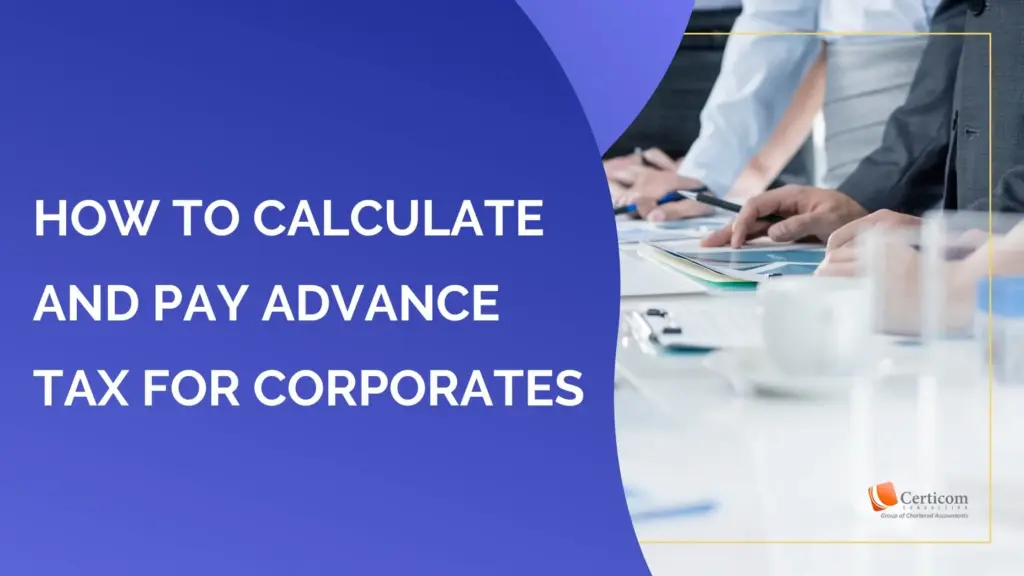How to Calculate and Pay Advance Tax for Corporates

Advance tax, often referred to as “pay-as-you-earn,” is the income tax payable in advance as per the provisions of the Income Tax Act. Sections 208 and 209 of the Income Tax Act outline the rules and computation methods for advance tax. This guide provides an overview of advance tax for corporates, the instalments involved, steps for online payment, and the consequences of non-payment or delayed payment.
Basics of Advance Tax for Corporates
Advance tax is mandatory for corporates with an estimated tax liability of INR 10,000 or more for the financial year. According to Rule 125 of the Income Tax Rules, corporate taxpayers must pay their taxes, including advance tax, electronically.
Advance tax is calculated on the estimated tax liability for the financial year. The following steps outline the computation process:
Estimate Total Income: Calculate the total income under all heads for the financial year.
Apply Deductions and Exemptions: Deduct all eligible tax credits, exemptions, rebates, and deductions from the total income.
Determine Taxable Income: Subtract deductions from the total income to compute taxable income.
Compute Tax Liability: Apply the applicable income tax rate to the taxable income and account for Tax Deduction at Source (TDS). The resulting figure is the advance tax payable.

Instalments of Advance Tax for Corporates
Corporates are required to pay advance tax in four instalments as outlined below:
Instalment Due Date Percentage of Estimated Tax Liability First 15th June 15% Second 15th September 45% (less the amount paid earlier) Third 15th December 75% (less the amount paid earlier) Fourth 15th March 100% (less the amount paid earlier) Key Points:
Any tax payment made by 31st March qualifies as advance tax.
If the due date falls on a bank holiday, the next working day is considered the last day for payment.
Steps for Online Payment of Advance Tax for Corporates
Follow these steps to pay advance tax online:
Visit the Income Tax Portal: Go to https://www.incometax.gov.in/iec/foportal/.
Access e-Pay Tax: Under Quick Links, select ‘e-Pay Tax’.
Enter PAN Details: Provide the company’s PAN and confirm it by re-entering. Enter the mobile number and click ‘Continue’.
Authenticate: Enter the OTP received on the registered mobile number.
Select Tax Type: Choose ‘Income Tax’ and click ‘Proceed’.
Enter Tax Details: Fill in details such as tax amount, surcharge, cess, interest, penalty, and others. Click ‘Continue’.
Choose Payment Mode: Select the payment mode and bank, then click ‘Continue’.
Verify and Pay: Review the challan details in the preview, verify, and click ‘Pay Now’.

Consequences of Non-Payment or Delayed Payment
Failure to pay advance tax or delayed payment attracts interest under Sections 234B and 234C of the Income Tax Act:
Interest under Section 234B:
Levied at 1% per month if at least 90% of the advance tax is not paid by 31st March.
Interest under Section 234C:
Levied at 1% per month for delays in instalments as detailed below:
| Instalment Due | Interest Period | Interest Calculated on |
| 15% by 15th June | 3 months | 15% of total tax – tax paid till 15th June |
| 45% by 15th September | 3 months | 45% of total tax – tax paid till 15th September |
| 75% by 15th December | 3 months | 75% of total tax – tax paid till 15th December |
| 100% by 15th March | 1 month | 100% of total tax – tax paid till 15th March |
By adhering to these provisions, corporates can avoid penalties and ensure compliance with tax laws.
Related Post
A Beginner’s Guide to E-Filing Income Tax Return for FY 2024-25
Faking Tax Deductions? You Could Be Penalised Up To 200% Under Income Tax Rules
Book A One To One Consultation Now For FREE
How can we help? *




